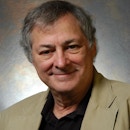Adventures in Cancer Immunotherapy: The Role of the Immune System in Cancer Therapy
- Speaker
-
 Arnold J. Levine, Ph.D.Systems Biology Professor Emeritus, Institute for Advanced Study
Arnold J. Levine, Ph.D.Systems Biology Professor Emeritus, Institute for Advanced Study
Presidential Lectures are free public colloquia centered on four main themes: Biology, Physics, Mathematics and Computer Science, and Neuroscience and Autism Science. These curated, high-level scientific talks feature leading scientists and mathematicians and are intended to foster discourse and drive discovery among the broader NYC-area research community. We invite those interested in the topic to join us for this weekly lecture series.
In the 1960s, Lewis Thomas postulated that cancer cells in the body expressed foreign antigens. The human immune system, he proposed, recognized these antigens and killed the cancer cells. The next forty years saw a largely fruitless search for cancer-produced antigens recognized by killer T cells. Finally, researchers discovered that although cancer cells are recognized by the immune system, the cells acquired a set of proteins that protected against killer T cells. In these cases, tumors exhibit a “self-tolerance.” Certain antibodies can block the functionality of these self-tolerizing proteins, permitting T cells to kill the tumor cells. As potential therapies using this technique were explored, a number of complicated problems arose. This therapy worked with some tumor types, but not others. Even for the same tumor type, some cancers responded to this therapy, while others did not.
In this lecture, Arnold Levine will discuss how recent studies have illuminated a great deal about the human immune system and its complexities. Methods for sequencing T cell receptors and quantifying their diversity have been developed. Antigens recognized by these T cell receptors can be identified by matching amino acid sequences to mutations in the DNA sequences of cancers and the microbiome. Algorithms are being developed to identify responders and non-responders, identify tumor antigens and explore the vitality and functionality of the immune system.
These studies have elucidated a great deal about the complexities of the human immune system, but this area of research has just begun.
